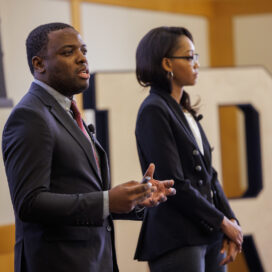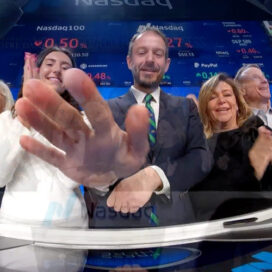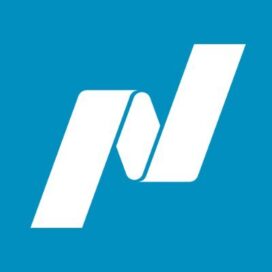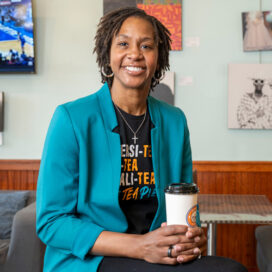Those who give us hope
Published: January 1, 2009 / Author: Carolyn Woo
Reminded daily of the market debacle and human folly that caused it, it is easy to lose faith in human beings and the sense that care for the common good prevails in our society. It is in such moments that we must also note evidence to the contrary. More important is the fact that we cannot afford cynicism. It is an indulgence that will cause us to stop hoping and abandon actions that we need to take.
Following are stories of hope—of people who make a difference, who seek a solution, who are not intimidated by the size of the challenge they face. They show us compassion, ingenuity, passion and enterprising endeavors. While they emerge from my network at the University of Notre Dame, I have no doubt that you will find similar stories among people you know: Young and old, students you’ve encountered, maybe your own children, spouses, co-workers, people in your community, those in your neighborhood. These stories make the point that cynicism is an unworthy response to difficulties— unworthy of these entrepreneurs, unworthy of us, unworthy of the talents and empathy that we can bring to the table.
The stories also illustrate the importance of market mechanisms for achieving results. They show the outcomes that can be achieved when actions for the common good interact with the market to bring about solutions. The key to successful community development and alleviation of poverty is the establishment of sustainable and scalable operations. These models comprise the foundation for addressing some of the world’s most pressing social needs.
Andean Health & Development (AHD)
David Gaus (’84) studied accountancy at Notre Dame, but decided to become a doctor after a year of service in Ecuador. In 2001, he opened a hospital in Pedro Vicente Maldonado, an Ecuadoran community of approximately 50,000 extremely poor inhabitants with little access to healthcare. Supported by donations for most of its first seven years, the hospital is now self-sustaining, the first hospital of its kind in rural Latin America that offers quality care on a permanent basis through local funding. Invited by Ecuador’s Ministry of Health to replicate the AHD model, David and the AHD team have started work in la Mana in the Cotopaxi Province southwest of Quito.
Por Fin Nuestra Casa (PFNC)
One idea really can change the world. the translated company name, “Finally, a Home of our Own,” re?ects the vision of 2008 Notre Dame graduate Pablo Nava and his PFNC co-founders to provide more than shelter to impoverished families living in Mexico’s border towns; they also hope to build safe communities and raise the standard of living. By using surplus shipping containers as the building blocks for homes, Pablo’s simple yet profound idea will provide a 320-square-foot, safe home with a kitchen, a bath with indoor plumbing, separate sleeping areas for children and parents and external paint that de?ects heat—all at an affordable price.
PEPY Tours
Started by Notre Dame alumna Daniela Papy after winning the 2006 Social Venture Plan Competition, PEPY tours offers eco-friendly standard and custom bike tours for visitors in Cambodia. Capital investment is low and the proceeds are used to fund elementary schools for girls. Three years after its founding, PEPY tours has gained attention as well as funding to support up to six schools. Young girls who achieve perfect attendance at graduation are awarded a bicycle.
Sustainable Health Enterprises (SHE)
Conceived by Notre Dame alumna Elizabeth Scharpf, SHE is in the process of developing a low-cost sanitary napkin that will be affordable for women in developing countries. UNICEF reports that 1 million to 5 million pubescent girls in Africa (10 percent of school-aged girls) miss school because of a lack of access to feminine hygiene products. SHE will meet the needs of these girls by not only supplying napkins, but by developing a franchised business owned and operated by women in the community that will manufacture and distribute affordable, high-quality and environmentally friendly sanitary towels for domestic and international markets.
HOPE is the opposite of cynicism. The personal responses above illustrate not just a campaign promise of the president-elect, but our most important trait as a human community. When we wring our hands at the market downturns and lament the state of affairs, we should pause to remember those who could not help but to hope—to work to turn the tide and tilt the scale in favor of a more just and caring society. They are our hope. They remind us that we can be hope for others.
The following three cases demonstrate the extensive opportunities and transformations in the developing world enabled by low-cost, fast, portable computing. Such devices are now used to gain market information, facilitate trade, obtain credit, provide education, enhance security or enable consultation on health, agriculture and other matters.
Mustard Seed
Led by Father Gregory Ramkissoon in Jamaica, Mustard Seed currently has approximately 11 locations in multiple Caribbean countries and provides a myriad of services to the impoverished and neglected. Fr. Gregory uses his it system to conduct remote medical consultations. At the Kingston location, the patient is both seen and interviewed by doctors at a hospital in Ireland. Despite some constraints to the arrangement, the project has been so successful that Fr. Gregory is looking to expand this capability to other locations.
Battery Operated Systems for Community Outreach (BOSCO)
Notre Dame alumnus Gus Zuehlker, director of faith formation for St. Bavo Catholic Parish in Mishawaka, Ind., founded BOSCO after a visit in 2006 to Pagak displacement camp in the heart of a Ugandan war zone. Realizing the displaced people lacked a voice, Zuehlker started BOSCO—named after humanitarian St. John of Bosco—to provide solar-powered, wireless computing and telephony throughout the region. This technology has signi?cant impact because it enables communication of the plight of the refugees, education through the internet for the children, advocacy for assistance, early warning of attacks, and economic development through trading. For $180,000, this equipment was set up initially in seven displaced-person camps. Full implementation—roughly 60 camps—will cover 1 million displaced people, over an area comprising about one-third of Uganda.
Catholic Relief Service (CRS)
CRS, with a grant from the Bill and Melinda Gates Foundation and support from Intel, will place $400 Intel laptops with 70 local partners in 200 locations in six African Great Lakes countries. The laptops will enable farmers to diagnose, monitor and report strains of the Cassava Mosaic Virus Disease, which has devastated as much as 80 percent of the vital cassava crop. The project also will train farmers in integrated crop management options, develop decentralized seed distribution systems, and build marketing skills and market communications for 14,000 farmer groups.
Dr. Carolyn Y. Woo is the Martin J. Gillen Dean and the Ray and Milann Siegfried Chair in Entrepreneurial Studies at the Mendoza College of Business at the University of Notre Dame. Dr. Woo’s research focuses on strategy, entrepreneurship and organizational systems. She received her bachelor’s, master’s and doctoral degrees from Purdue University.
###
/news_and_events/news_articles/article/2205/those-who-give-us-hope




